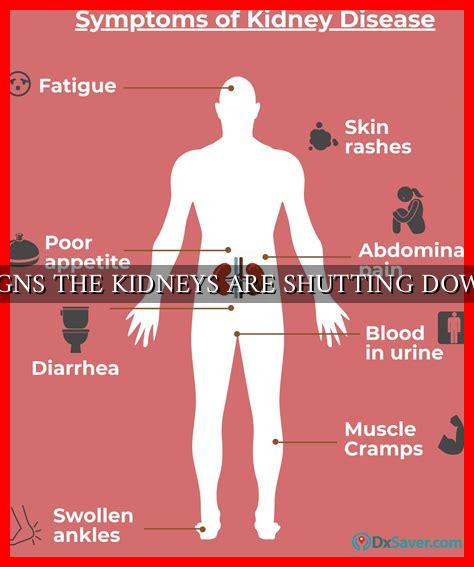-
Table of Contents
SIGNS THE KIDNEYS ARE SHUTTING DOWN
The kidneys are vital organs responsible for filtering waste and excess fluids from the blood to produce urine. When the kidneys start to shut down, it can have serious consequences for the body. Recognizing the signs of kidney failure is crucial for early intervention and treatment. In this article, we will explore the key signs that indicate the kidneys are shutting down.
1. Decreased Urination
One of the first signs of kidney failure is a decrease in urine output. This can be due to the kidneys’ inability to filter waste and produce urine effectively. If you notice a significant decrease in the amount of urine you are passing, it could be a sign that your kidneys are shutting down.
2. Swelling
Swelling, also known as edema, can occur when the kidneys are not functioning properly. This is because the kidneys play a crucial role in regulating fluid balance in the body. When the kidneys are shutting down, excess fluid can build up, leading to swelling in the hands, feet, face, or other parts of the body.
3. Fatigue
Chronic kidney disease can cause fatigue and weakness due to the buildup of waste products in the blood. When the kidneys are shutting down, they are unable to effectively remove these toxins, leading to feelings of tiredness and lethargy.
4. Nausea and Vomiting
As kidney function declines, waste products can accumulate in the body, leading to nausea and vomiting. These symptoms can be particularly severe in advanced stages of kidney failure and may require medical intervention.
5. Changes in Urine Color
Changes in urine color, such as dark urine or blood in the urine, can be a sign of kidney damage. This can indicate that the kidneys are not filtering waste products effectively, leading to abnormal urine coloration.
6. High Blood Pressure
High blood pressure is a common complication of kidney disease. When the kidneys are shutting down, they may not be able to regulate blood pressure effectively, leading to hypertension. Monitoring blood pressure regularly is important for detecting kidney issues early.
7. Loss of Appetite
Loss of appetite can be a sign of kidney failure, as waste products can build up in the blood and affect the digestive system. If you experience a sudden loss of appetite, it is important to consult a healthcare provider for further evaluation.
8. Muscle Cramps
Electrolyte imbalances due to kidney failure can lead to muscle cramps and weakness. Potassium and calcium levels can be affected when the kidneys are shutting down, resulting in muscle cramps and spasms.
Conclusion
Recognizing the signs of kidney failure is crucial for early intervention and treatment. If you experience any of the symptoms mentioned above, it is important to consult a healthcare provider for further evaluation and management. By being aware of the signs that indicate the kidneys are shutting down, you can take proactive steps to protect your kidney health and overall well-being.





